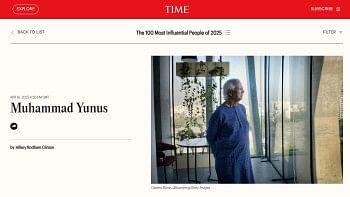A Man with a Mission

Mahmudur Rahman Benu in a still from "Muktir Gaan". Photo Courtesy: Tareque and Catherine Masud
With dawn approaching, the eastern horizon gradually brightened up. A dreamy eyed Mahmudur Rahman Benu sat idly atop a rundown bus, vocally articulating morning ragas Bhairavi and Raamkeli.
Benu was on his way back from the routine visits to the Mukti Bahini (freedom fighters') camps near the border with his music troupe, when the bus tyres burst. While the driver replaced the tyres, a sleepless Benu practiced sargam along with his team-mate Bipul Bhattacharya. Deep down, Benu tried to divert his mind from the war waged against his country, just across the border. When the army started the crackdown Benu didn't hesitate to join the Bangladesh guerrilla forces to fight the Pakistani army.
Mahmudur Rahman, popularly known as "Benu bhai" to many, had just crossed the Benapole border and joined the Mukti Bahini, under Capt Hafiz aka Major Hafiz, at Petrapole, Jessore sector.
A dedicated cultural activist and graduate from Chhayanaut, the spirit of patriotism was ingrained in Benu at an early age. His mentors at Chhayanaut -- Waheedul Haque, Sheikh Luthfar Rahman and Zahedur Rahim -- strengthened his passion even more. When the war intensified, Benu replaced his ammo with harmonium to inspire the countless freedom fighters who were camped at the war front. Unarmed and fearless, he led his team, the Mukti Sangrami Shilpi Sangstha, to the edges of the battlefield.
On my recent visit to London we talked about his experiences during the war and his involvement with the cultural scenario in London now.
"During the Liberation War," Benu went on, "everyday we would visit from five to seven camps in a minibus. We would sing Gano Sangeet to lift the spirit of the soldiers. We were given meagre pocket money and lunch boxes to sustain throughout the day. We would sing around 70 songs everyday. By the time we reached home late in the night, our voices were cracked and bodies sore. But we would prepare ourselves for the next day. Our only mission was to boost the morale of the Mukti Bahini. Our patriotic songs were our weapons to fight the invaders," Benu's eyes sparkled as he spoke.
Benu had settled in Leeds in 1973. After 10 years he moved to Sheffield and later to London in 1993.
Despite your role in the war, why did you decide to settle abroad? I asked. "Well I'm often confronted with this question. Even if I stayed in Bangladesh my mission would have been no different."
And what is that? I asked. "When I came over as a student, what struck me most was the distressing state of the Bangladeshi community settled here. Other than a handful, most of them had difficulty in communicating, writing or reading letters. My instincts were to immediately help them. I tried to make them aware of their history and take pride in their roots as well.
"While teaching English, Mathematics and Bangla at Waltheos Secondary School, I would often explain to them about Bangladesh, its culture and the bloody war through which we gained our independence. Gradually a noticeable change came about in the attitude of the young boys and girls of the school. It is with pride that I felt that parents became more and more eager to admit their children to the school where I taught."
In a speech, the head teacher of the school specially highlighted Benu's undeniable role in drawing people closer. In his long career, the head teacher had never witnessed such strength of influence of one man to dramatically change the mindset of a community like Benu had accomplished.
In London, Benu introduced various cultural programmes, including Pahela Boishakh (Bangla New Year celebration) and other festivities that are observed in Bangladesh. This not only instilled passion amongst his students to learn more about their origins but the community as a whole grew a sense of pride in their cultural roots and developed a positive attitude towards their heritage.
Benu's uncompromising attitude towards music and the teachings of Chhayanaut inspired him to open several branches all over London. "I teach songs related to our culture -- Indian classical, ghazals, Nazrul Sangeet and more," he said.
The artiste who had long back sown the seeds of belonging amongst a community now watches with a certain sense of pride as those seeds have flourished and brought two worlds closer. The passion with which he had fought for the country's independence still runs deep to spread that country's cultural influence ever further. As far as he is concerned, he still patrols the boundaries of his country -- if not geographical, certainly the cultural one.

 For all latest news, follow The Daily Star's Google News channel.
For all latest news, follow The Daily Star's Google News channel. 



Comments